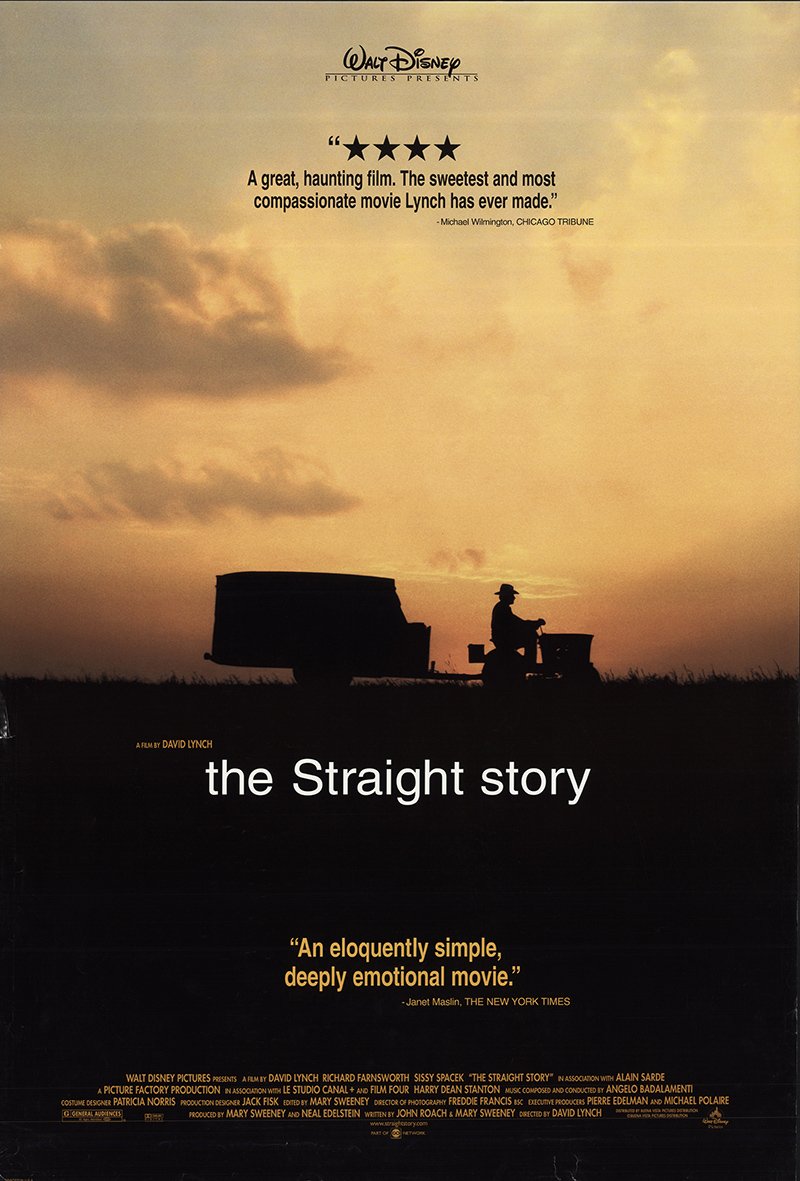Film Review: The Straight Story (1999)



I’ve always thought David Lynch had a unique way of using silence in his films. Often, characters will pause for long moments while they appear to digest what’s been said to them, then shift uncomfortably in their stance and offer a short reply that isn’t necessarily one appropriate for the original statement. The first speaker doesn’t seem to mind that they haven’t gotten the response they were looking for and after another drawn-out pause, the cycle begins again with an odd facial expression or a simple nod of the head.
Lynch has a knack for transforming the mundane into awkward, dreamlike bursts of surreality (or depicting the nightmarish as nonchalant or every day) with this unique brand of editing and dialogue exchange. It’s used effectively in films like Eraserhead (1977) and Mulholland Drive (2001) but became a phenomenon with the airing of television’s Twin Peaks in 1990 – the project that made Lynch a household name.

The technique is also used in The Straight Story, a G-rated film made for Walt Disney Pictures in 1999. This time Lynch doesn’t use silence and long pauses to create a sense of abnormality or to put viewers out of their comfort zones, but to draw them into each scene and welcome them into the warmth and humanity unfolding on screen. What Lynch has done is turn one of his signature styles on its head while making one of the most endearing and heartfelt films of the ’90s.

Based on the true story of Alvin Straight, Lynch takes us on a slow but powerful journey across the Midwest via a 30-year-old riding lawnmower and the wisdom of an old man. Alvin (Richard Farnsworth, in an Oscar-nominated performance which would also be his last) has received word that his estranged brother has suffered a stroke. Because of his age and health, Alvin can’t get a driver’s license to make the 240-mile trek so he does what any sensible man would do in his situation: he hitches a trailer to a John Deere riding mower and hits the road.

Through conversations Alvin has with those he meets on his unconventional journey, we come to know the man, what makes him tick, and the causes of his melancholic demeanor. A proud man, Alvin is often reluctant to give answers to the questions asked of him or to reveal himself to strangers but offers kind words and fitting anecdote nonetheless. He doesn’t like to see others in pain, so finds it within to relate hard truths about his past to see others through difficult times. He’s honest and unselfish, but through his story, and the stories he brings out of others, he begins to heal and to accept the inevitable.

Something that makes The Straight Story so effective is that Lynch gives us plenty of time for contemplation. When Alvin tells a story, he does so slowly and deliberately. Each word builds on the next until we’re left with either bits of wisdom hard to argue or pure and honest emotional responses. Without these purposeful moments of reflection, the power of Alvin’s saga would ring false or forced. Instead, time is given for us to bring our experiences into the mix, adding a new layer of soul-stirring possibility to each scene.

Farnsworth is nothing short of remarkable as the resolute Alvin Straight. The veteran craftsman was in the final stages of terminal cancer during the shoot but, like Alvin, was determined to finish what he had started. The landscapes Farnsworth rolls through (the film was shot along the same route the real Alvin Straight took in 1994) are as naturalistic as the actor himself. Subdued and rolling, the Iowa and Wisconsin plains mimic Farnsworth’s performance in their subtlety and inspiration. The results speak for themselves and are a testament to the guts and grit of an actor who was a true treasure.
Sissy Spacek turns in an equally moving performance as Rose, Alvin’s daughter who carries her own tragedy. Seemingly fleeting moments early in the film are filled with meaning as Alvin speaks fondly of the love he has for his daughter and laments on the sorrow he feels for her. Spacek embodies both sympathy and strength wrapped into one, with neither overtaking the other.

Lynch has called The Straight Story his most experimental film. That statement could only make sense for a director of his reputation and avant-garde sensibilities, but I agree with him. Where many of his films follow a surrealist’s dream logic and an eccentric’s tastes, Alvin’s path is linear. In one of the most sincere and genuinely moving endings I can recall, The Straight Story follows a clear line from its beginnings in small-town Iowa to the steps of an old man’s cabin 240 miles down the road.
